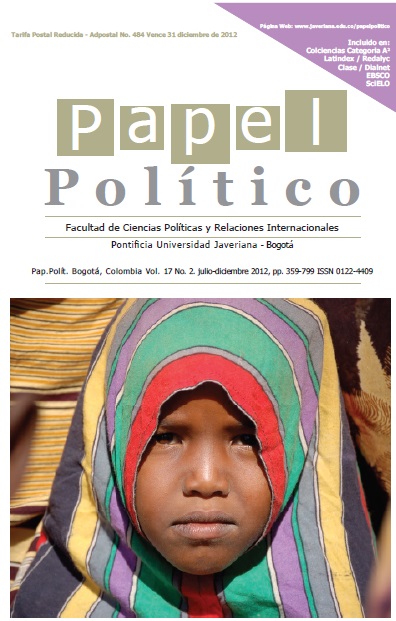Resumen
Todo proceso de conflicto y violencia marca una fragmentación social que conlleva dinámicas de ruptura de lo público que rebasan los mecanismos
alternativos de resolución de conflictos. Por ende, la etapa de posconflicto debe ser contenida por una propuesta de política pública de reconciliación
social que garantice la efectividad de los procesos conducentes a la convivencia y coexistencia, fundados en principios de ética pública.
Desde esta perspectiva, la dinámica suscitada en Colombia desde la iniciativa gubernamental dela Ley de Justicia y Paz (2005), con sus consecuentes avances en materia de Ley de Víctimas y Restitución de Tierras (2011) y el llamado “Marco Jurídico para la Paz” (2012) constituyen
una aproximación normativa e institucional que debería consolidarse en una política pública, fundada en principios de ética pública para que sea efectiva. Para confrontar esta urgente necesidad de avanzar más allá de mecanismos alternativos y marcos jurídicos, la revisión de los casos de Sudáfrica y Centroamérica (El Salvador y Nicaragua) ofrecen herramientas de reflexión para contemplar lo acertado que puede ser la instauración de una política de Estado conducente a la reconfiguración social después
de largos peroodos de conflicto y violencia. La configuración de un reconciliation framework puede ofrecer garantías para esta labor.
Esta revista científica se encuentra registrada bajo la licencia Creative Commons Reconocimiento 4.0 Internacional. Por lo tanto, esta obra se puede reproducir, distribuir y comunicar públicamente en formato digital, siempre que se reconozca el nombre de los autores y a la Pontificia Universidad Javeriana. Se permite citar, adaptar, transformar, autoarchivar, republicar y crear a partir del material, para cualquier finalidad (incluso comercial), siempre que se reconozca adecuadamente la autoría, se proporcione un enlace a la obra original y se indique si se han realizado cambios. La Pontificia Universidad Javeriana no retiene los derechos sobre las obras publicadas y los contenidos son responsabilidad exclusiva de los autores, quienes conservan sus derechos morales, intelectuales, de privacidad y publicidad.
El aval sobre la intervención de la obra (revisión, corrección de estilo, traducción, diagramación) y su posterior divulgación se otorga mediante una licencia de uso y no a través de una cesión de derechos, lo que representa que la revista y la Pontificia Universidad Javeriana se eximen de cualquier responsabilidad que se pueda derivar de una mala práctica ética por parte de los autores. En consecuencia de la protección brindada por la licencia de uso, la revista no se encuentra en la obligación de publicar retractaciones o modificar la información ya publicada, a no ser que la errata surja del proceso de gestión editorial. La publicación de contenidos en esta revista no representa regalías para los contribuyentes.


